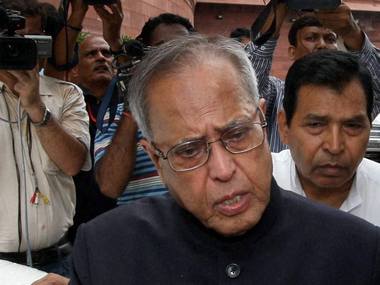Colossal failure can be repackaged as resounding success by the simple expedient of shifting the goalpost.
That’s exactly what the government did on Thursday when its stake sale in ONGC - its first attempt at auction-based disinvestment in public sector undertakings - appeared to have bombed spectacularly. It resorted to sleight of hand, bent the auction rules with help from the market regulator Sebi, corralled other PSU into putting in bids, and pushed in their bids through the back door long after the deadline had expired
[caption id=“attachment_223856” align=“alignright” width=“380” caption=“The government is window-dressing its financials. PTI”]  [/caption]
And late at night, finance ministry officials crowed that the 5 percent share sale had been a success, and the government had raised as much as it had expected to from the disinvestment. They dismissed the notion that the auction had not received sufficient traction, as reflected in stock exchange data, by claiming that there had been “technical glitches” in the auction process, as a result of which some bids could not be registered.
It’s a plausible explanation, except that taken with other straws in the wind, it points to a government that is desperately window-dressing its financials in the weeks ahead of the Budget by arm-twisting PSUs into coughing up big money to meet its disinvestment target, and help bridge the horrendously high fiscal deficit.
Simultaneously on Thursday, the disinvestment department lined up eight cash-rich PSUs that it proposes to milk in order to fill its khazana and tidy up its balance-sheet projections for the next year. Here too, the effort is too clever by half: the PSUs will ostensibly be ‘buying back’ equity from the government, and the government will cite those proceeds to claim that its financials are smelling of roses.
Impact Shorts
More ShortsWhy is Pranab-da resorting to all this sleight of hand trickery? Quite simply, because his numbers aren’t adding up. The runaway spending of an incontinent government, and the soaring fuel subsidy bill, have blown a big hole in his budget, which he cannot hope to fill any other way.
The fiscal deficit has already overshot its estimates for the year, and the government has fallen way short of realising its disinvestment target. And with the deficit widening alarmingly, and with rating agencies watching closely for further signs of profligacy, the Finance Minister is, as he has himself admitted, losing sleep over the prospect of balancing the budget.
Mukherjee would not share details of the ‘buyback’ proposal, saying that the matter would be made public after observing due administrative process, but the disinvestment department has sought an “enabling provision” from the Cabinet Committee on Economic Affairs (CCEA) to seal the deals on behalf of the central PSUs.
Central PSUs had earlier balked at depleting their hard-won cash reserves to buy back their shares at a time of great business uncertainty. From all accounts, under the new proposal, the buyback proposal can be rammed through the ministries without having to tolerate the squawks from the PSUs themselves.
It’s easy to see why Pranab-da is sounding defensive about going public with details of the ‘buyback’plan. It is a sneaky attempt to fill the government’s coffers by shifting the goalpost and transferring funds from cash-rich PSUs onto the government’s balance-sheet. It should occasion shame in anyone, but that emotion is alien to this government.


)

)
)
)
)
)
)
)
)



